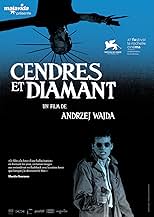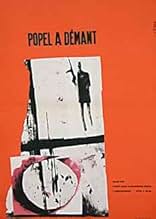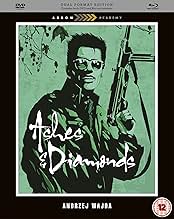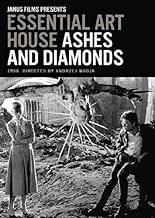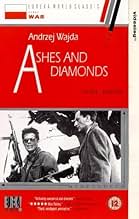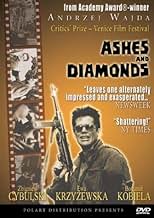Al término de la Segunda Guerra Mundial y la ocupación alemana, la resistencia polaca y las fuerzas rusas se enfrentan entre sí en un intento de asumir el liderazgo en la Polonia comunista.Al término de la Segunda Guerra Mundial y la ocupación alemana, la resistencia polaca y las fuerzas rusas se enfrentan entre sí en un intento de asumir el liderazgo en la Polonia comunista.Al término de la Segunda Guerra Mundial y la ocupación alemana, la resistencia polaca y las fuerzas rusas se enfrentan entre sí en un intento de asumir el liderazgo en la Polonia comunista.
- Dirección
- Guionistas
- Elenco
- Nominada a2premios BAFTA
- 1 premio ganado y 2 nominaciones en total
- Stefka
- (as Barbara Kraftówna)
- Barmaid Lili
- (as Z. Czerwinska)
- Franek Pawlicki
- (as W. Grotowicz)
- Jurgieluszka
- (as I. Orzewska)
- Smolarski
- (as M. Loza)
- Puciatycka
- (as H. Siekierko)
Opiniones destacadas
It's really the way how this movie looks that made this an interesting and good watch for me. It features some beautiful black & white cinematography and it has some some really strong and unforgettable images in it.
The story in itself is being kept deliberately small and simple. The movie very rarely dwells, which is a good thing but it at the same time also prevents this movie from making a truly lasting impression with a good or powerful story. In my opinion the movie was lacking this, which prevented me from truly regarding this movie as a perfect movie, or a must-see classic, even though it is generally being regarded as perhaps the best and most definitive Polish movie ever made.
Neverhteless, the characters all do work out well, due to the movie its story and overall approach. It was also truly a pleasure to watch Zbigniew Cybulski act, who is known as the Polish James Dean. He was truly great and really solely carried the movie, for most part.
Due to the fact that the movie is being kept simple and small, there is also very little to indicate in this movie that it's actually one being set during WW II. Don't know whether this was done intentionally or not but anyway, I liked that about this movie. It's a war movie without the war and everything that goes along with that and basically all that ever indicates that there is war going on is shown by the presence of a few soldiers.
A solid but above all things beautifully directed movie, by Andrzej Wajda.
8/10
http://bobafett1138.blogspot.com/
If you know nothing about how the movie got made, this seems to be the whole purpose. But there are other points. In a mini-documentary about the movie, Andrzej Wajda and his collaborators explain how the novel on which the movie is based had Szczuka as the main character. Wajda not only moved the focus to Maciek - and gave him sort of a James Dean look - but also stressed the scene where Maciek talks with the man who fought in the Spanish Civil War. Apparently, fighting like the man did is a Polish tradition. Therefore, the film likely appeals to the Poles in almost every way; the perfect Polish movie, if you will.
Although I've never seen any of Andrzej Wajda's other movies - hell, I'd never heard of him until the Academy Awards gave him an honorary Oscar - I staunchly recommend this one. One can clearly see how he used the movie to subtly challenge the Soviet domination of his country (of course, they couldn't openly say anything against the USSR). Poland's pro-Soviet government had approved the movie, but didn't want to let it outside Poland. Wajda got some people to smuggle it out of the country, and it reached much of the world. Probably the most amazing scene is the end. I won't spoil the end, but I'll note that blood on a white sheet looks a bit like Poland's flag (a nationalistic statement).
All in all, a great movie. Andrzej Wajda has every reason to be proud of it.
¿Sabías que…?
- TriviaEl Ciudadano Kane (1941) - and Gregg Toland's cinematography in particular - was a huge influence on Andrzej Wajda at the time. Like Toland, the first thing the film's cinematographer Jerzy Wójcik did was convince production designer Roman Mann to include ceilings in all the sets.
- ErroresGlasses of vodka are set alight which burn for an unnaturally long length of time and with a bigger flame than expected, suggesting a purer fuel was used in the film, such as petrol. Moreover, when the final flame dies (c.41 minutes) no liquid remains in the glass. Only the alcohol content is flammable in any glass of spirit and a residue of water would be left behind with even the very strongest of Polish vodkas.
- Citas
Krystyna: Look. An old crypt. An inscription. "So often are you as a blazing torch with flames of burning hemp falling about you flaming, you know not if the flames bring freedom or death, consuming all that you most cherish. Will only ashes remain, and chaos whirling into the void." The letters are blurred. I can't read it.
Maciek Chelmicki: It's by Norwid. "Or will the ashes hold the glory of a starlike diamond, the Morning Star of everlasting triumph."
Krystyna: That's beautiful. "Or will the ashes hold the glory of a starlike diamond..." And what are we?
Maciek Chelmicki: You - are definitely a diamond.
- ConexionesEdited into CzechMate: In Search of Jirí Menzel (2018)
- Bandas sonorasCzerwone maki
(Red Poppies) (uncredited)
Music by Alfred Schütz and lyrics by Feliks Konarski
Performed by Grazyna Staniszewska
Selecciones populares
- How long is Ashes and Diamonds?Con tecnología de Alexa
Detalles
Taquilla
- Presupuesto
- PLN 6,070,000 (estimado)
- Tiempo de ejecución1 hora 43 minutos
- Color
- Mezcla de sonido
- Relación de aspecto
- 1.66 : 1
Contribuir a esta página


